At “Social Changemakers: Combating Poverty In NYC Through Innovation,” a conference sponsored by the Gabelli School of Business and the Graduate School of Social Service (GSS) on April 24, some of the city’s most innovative change agents came together to share best practices to reduce poverty levels.
Among the panels that aimed to inspire collaboration and offer proactive steps to shrink poverty rates was “Poverty Solutions That Work.” Patrick Struebi, an adjunct professor at the Gabelli School and CEO of Fairtrasa, a global social enterprise that helps small-scale farmers rise out of poverty, moderated the discussion.
The panelists included:
- Mary Tobin, director of the Brownsville Partnership, which works to improve safety, health and economic prosperity in the Brownsville neighborhood of Brooklyn;
- Micheal Zisser, an adjunct professor at GSS and former CEO of the University Settlement and The Door;
- Maria Lizardo, executive director of the Northern Manhattan Improvement Corp., a nonprofit offering legal, social, education, and career services to members of the Washington Heights and Inwood community; and
- Rondo Moses, a consultant and board member of Uncommon Schools, a network of urban public charter schools that aims to close the achievement gap.
When asked by Struebi how poverty has changed in New York over the past 10 years, Moses said poverty has become more complex and is difficult to define on a uniform level, particularly in New York.
“Living in urban communities like New York City, you have to take into consideration basic living costs—housing, clothing, food, [and]transportation. When you take that into consideration, there are so many people actually living in poverty,” he said.
Tobin said an “access dilemma” and systemic lack of investments in poor communities has caused residents of Brownsville, Brooklyn, to remain impoverished as other areas of Brooklyn experience growth. In Brownville, 36 percent of residents live below the federal poverty line. The neighborhood also has the largest concentration of public housing in the country.
“You can see glaring pockets of prosperity and improvement in education, and people’s access to opportunities, but in Brownsville it’s economically depressed so you’ll see the poverty levels increasing,” said Tobin.
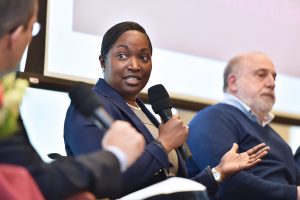
For Lizardo, some investments come with a price. She shared that the gentrification of areas in Inwood and Washington Heights has led to the displacement of low-income residents.
“Washington Heights and Inwood were the forgotten parts of northern Manhattan, but now we’re the ‘it’ neighborhood and so our families are getting pushed out,” she said.
Moses said empowering low-income students to see their education as a way out of poverty can create impact.
“When you look at the lifetime economic value of someone with a college degree versus someone who just got a high school diploma, there’s no question that there’s more value in finishing school and getting a higher education,” he said.
While New York state is “relatively rich” in terms of services that it offers to the poor, particularly when juxtaposed with other states around the country, Zisser said the challenge is figuring out how to effectively fund organizational and social infrastructures that address poverty and issues that contribute to it.
“It’s not that money is not being spent, it’s how it spent and where it’s spent,” he said. “There may be investments in programs, but not in social infrastructure or organizational infrastructure.”
Tobin encouraged leaders to recognize the power of data, which can help to inform decisions. She said “deliberate networking” and taking advantage of business deals that are being brokered in the community have helped to create opportunities for the population her organization serves.
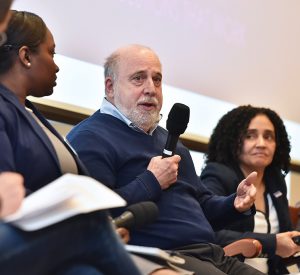
“It allows you to really leverage the talents and the benefits that are already in the community just by shifting your perspectives and how you work with your partners,” she said.
To successfully tackle poverty, organizations working in the human services sector should create a multiplicity of funding sources, according to Zisser.
“You want to diversify funding streams so that no one factor, or no one hit, could upset the balance of the institution,” he said.
Zisser said organizations, more than ever, will have to come up with innovative strategies to inspire future donors to invest in their cause.
“We might think that some of these questions of poverty are important, and they might think, “I’m done with that, I’m doing climate change,”’ he said. “It’s much more competitive.”
]]>The tool, known as Fordham’s Pope Francis Global Poverty Index (FFI), was presented publicly on Sept. 23 in conjunction with a University-sponsored conference, “Pope Francis’ Call to Escaping Poverty.”
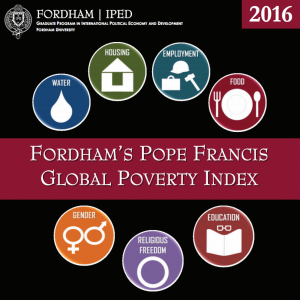
The FFI focuses on seven simple factors that the pope sees as indicators of poverty, and which he proposed at last year’s United Nations General Assembly: water, housing, employment, food, gender equality, religious freedom, and education. The innovative focus of both the pope’s proposal and the FFI is on political rights for the poor; few other poverty indexes distinguish these freedoms as vital indicators of poverty, said Henry Schwalbenberg, Ph.D., director of IPED.
“Studies show that there is, in fact, a connection between these spiritual indicators and hard economics,” he said. “Newly developed indexes are adding a multidimensional definition of poverty—and it’s a really great thing.”
By allowing those who are impoverished to improve their physical, economic, and mental well-being, they will be able to live independently and become “dignified agents of their own destiny,” as Pope Francis has described.
“We’re hoping that [our index] will empower civil societies,” said Schwalbenberg. “We want groups around the world to use this simple measure to hold their governments and other administrations accountable for the state of their society.”
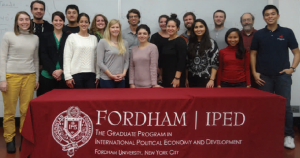
The 37-page FFI compiles statistics that civil organizations can use as a benchmark to determine the material and spiritual state of their populations, and work to improve them through the U.N.’s Sustainable Development Goals. While finding statistical data on most of the indicators was relatively simple, Schwalbenberg said, researching the connection between religious freedom and poverty proved difficult. In fact, it is a pioneering approach to looking at the issue.
“This aspect is ignored by many people but shouldn’t be. Religious freedom has a correlation to corruption and social hostility, which is why countries try to take religious freedom away,” said Schwalbenberg.
The report is being made available for download on Fordham’s IPED site over the next weeks. But this is only the start of the FFI, said Schwalbenberg, since now it is up to the people of the world to take it and adjust it to their own circumstances.
“This index isn’t set in stone; we want it to be expanded upon by other schools or communities. We tried to be as transparent as possible so people can make their own index. People will interpret Pope Francis’ speech differently and weigh different indicators more heavily than others. This is only the beginning of the process.”
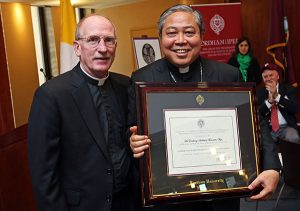
Photo by Bruce Gilbert
The day’s event also served as a venue for Joseph M. McShane, S.J., president of Fordham, to install Archbishop Bernardito Auza as the inaugural holder of the endowed Cassamarca Foundation Chair in Migration and Globalization. Archbishop Auza is the U.N.’s Observer of the Holy See.
“We are honored that you have accepted this post,” said Father McShane.
In addition, the conference featured lectures by Sabina Alkire of Oxford University; Liliana Carvajal, GSAS ’04, monitoring specialist of UNICEF; and others. It was co-sponsored by CAPP USA and was part of the University’s Dodransbicentennial celebration.
— Mary Awad
]]>- What is the single biggest obstacle facing humanitarian aid workers today?
Without a doubt, the single biggest obstacle is access. We are able to produce a lot of the resources that are needed by the beneficiaries—those refugees or displaced persons. Our problem is that we can’t get to them.
In many of the countries where we operate, we can’t deliver food and other things because of political obstacles. For example, to deliver aid in Syria today, agencies have to cooperate with whatever limits [President] Assad wants to impose—that includes which agency we can deliver aid through, and where the aid can go. Obviously he is not going send aid into the areas that are opposing him. Therefore it makes it very difficult to deliver aid neutrally, impartially, and independently. There are enclaves where no medicine has gone in for years, no anesthetics. You are putting people in medieval conditions. And it’s not just Syria. Almost everywhere we go, oppositions want to stop humanitarian agencies from delivering aid.
- Is there another significant obstacle?
The other point is that money is tight. We are probably about a billion dollars short for the crises we have today in the world. In the 1990s most of the large agencies were a third of the size they are today and there were not many small independent NGOS. If a crisis got 20 or 30 agencies, that was a good turnout.
There were more than a 1,000 agencies that responded to the 2010 Haiti earthquake crisis. Where did they all come from and the question we could ask—which is suitable to this ground—is how qualified are they to be there? No one wants to deny the good heart, but there are too many agencies vying for the same monies.
- Is forced migration overloading global humanitarian efforts?
The migration problem is massive. In the humanitarian aid world, we work with internally displaced people and refugees forced from their countries [as opposed to economic migrants]. People are fleeing from violence. They are saying there are 65 million people displaced in the world, a huge number. And it doesn’t seem to be getting any lower.
The economic migrant is the larger portion of migrants–coming from countries in desperate straights because of climate disasters or violence. It is very difficult to measure their numbers, very difficult to control them, very difficult to send them back, and very difficult to house them in your country.
Sadly, the animosity and aggravation that people have toward migrants is going to grow. To be honest, migrant populations are one lever for Britain to have made the choice that it did last week [on Brexit].
If there was peace and there were jobs in their own countries, most migrants would stay. Some people say wouldn’t it be better spending our money on creating peace, rather than providing aid for the people who are displaced. Now, we are back into money and political will.
But we are not doing enough about prevention.
- How does the IDHA program address these problems?
One of the strengths of the program is that we are up to date. We look at every crisis as it is today, not from 5 years ago. Every student that we have is going out to today’s crises, and what we did a decade ago no longer applies.The moment you get on the ground in any crisis, in the first few hours everything changes. The police should be there; they’re not. The government should be there; it’s not. Everything is changing constantly.
In order to make sure we are up to date, we change our lecturers each and every term. We bring them in strait out of the field. This session we had a young Kenyan woman who has been in the field for 5 or 6 years. We have two people who were just in Gaza. These lecturers can talk about the ethical or political questions, or even about communications problems, because they were literally just there.
Whether they can tell us that ‘it worked,’ or ‘it would work better with something else,’ they remind us that humanitarian aid is a moving philosophy—and you have to go with it.
]]>
]]>
General Roméo Dallaire, the UN force commander during the Rwandan Hutu-Tutsi genocide, speaks about nations’ obligation to intervene.
“Poverty and Development: A Catholic Perspective,” which was co-sponsored by Fordham’s International Political Economy and Development Program, featured a multinational delegation that included the Vatican Secretary of State, Pietro Cardinal Parolin, and other high-level church officials. The conference is one of three that are being cosponsored worldwide by Centesimus Annus Pro Pontifice (CAPP), the Vatican foundation created by St. John Paul II to promote Catholic social teaching.
Representatives from each of the three conferences will present their findings to the pope this spring.
“Our world has undergone seismic social changes,” said Archbishop Silvano Maria Tomasi, C.S., Papal Nuncio to the United Nations. “Inequality has worsened, both within developed countries and between developing and developed countries, increasing the gap between persons at the extremes of income distribution.
“There is a growing danger that this state of affairs is becoming accepted as the new normal.”
Before countries can even begin to tackle poverty, they must first address rampant violence around the world, cautioned General Roméo Dallaire, the UN force commander during the Rwandan Hutu-Tutsi genocide in 1994.
Rwanda is a grim example of the developed world’s attitude toward intervening in conflicts, the general said. In 100 days, more people were “killed, injured, internally displaced, and raped” in Rwanda than in the six years of ex-Yugoslavian warfare, which was occurring around the same time, he said.
The world came to Yugoslavia’s aid. It did not come to Rwanda’s.
Troubled by this discrepancy, General Dallaire, who is a senior fellow at the Montreal Institute for Genocide and Human Rights Studies, conducted a study, “The Will to Intervene,” to investigate how leaders decide to intervene. The team found that the decision often comes down to a single principle: What’s in it for us?
Their findings corroborated what General Dallaire had experienced firsthand. One by one, nations’ reconnaissance teams arrived in Rwanda to assess the efficacy of intervening and left advising their home countries against involvement. They argued that the country lack “strategic resources” and was not in a strategic location.
“One nation’s representative told me, ‘The only thing that’s here are human beings, and there’s too many of them anyway,’” the general said. “Humanity was not even a factor. And so, the killing went on.”
General Dallaire urged the conference participants to promote a policy of intervention based in humanitarianism, not self-interest. This is especially important in cases where children are being used in warfare, which has characterized many conflicts, including those currently plaguing the Middle East.
According to the general, the use of children in war obliges countries to intervene.
“In the past, children were used in wars in spite of their age, because they were the only fighters left. Now, we use them because of their youth. And it’s not just boys—40 percent are girls who are used as cooks, spies, and ultimately sex slaves and bush wives. This is the weaponry of our era—our children.”
Failure to intervene—both during a crisis and before one erupts—will continue to prove catastrophic.
Archbishop Silvano Maria Tomasi, C.S., Papal Nuncio to the United Nations.
Photo by Bruce Gilbert “The slaughter in Rwanda 20 years ago was done not by adults, but by a youth militia—young people who were indoctrinated into a political party, nurtured by a radio station, and given opportunities and empowerment,” he said. “In a country that is 90 percent Catholic, militants were able to make the youth the primary instrument to slaughter 800,000 other Catholics.”
At a dinner event later that evening, Secretary of State Cardinal Parolin described the Vatican’s stance on issues such as poverty and security. He reiterated Pope Francis’ message to the United Nations earlier this year, saying that entrepreneurship must be balanced by virtuousness in the pursuit of human progress.
“Economic activity should contribute to integral human development for everyone so that ‘humanity is served by wealth and not ruled by it,’” Cardinal Parolin said. “There must be the firm commitment to ensure that private enterprise strives for the common good. Thus, in every business activity, the personal and social virtues of honest, integrity, fair-mindedness, generosity, and concern for others should prevail over the maximization of profits.”
Joseph M. McShane, S.J., president of the University, said Fordham was honored to host such a crucial discussion.
“The world is unstable, violent, and unjust—but it’s a world that, because of Pope Francis, is being called with greater urgency and effectiveness than ever before,” he said. “The least-known treasure of the Church is Catholic is social teaching. The world needs it more than ever.”
Other speakers included Chibly Cardinal Langlois, bishop of Les Cayes, Haiti, and Metropolitan Jean Clément Jeanbart, archbishop of Aleppo, Syria.
]]>The conference, “Poverty and Development: A Catholic Perspective,” is one of three being cosponsored around the world by Centesimus Annus Pro Pontifice, the Vatican foundation created by St. John Paul II to promote Catholic social teaching.
Representatives from each of the three conferences will present findings to Pope Francis in the spring.
The conference will highlight poverty and development issues raised by the pontiff and help the Catholic community decide how best to address them, said Henry Schwalbenberg, Ph.D., associate professor of economics and director of Fordham’s Graduate Program in International Political Economy and Development, which is co-sponsoring the event.
“It’s to inform each other about what’s going on, say in Haiti, or in Syria, or Rwanda, and how we should be responding—are we doing enough, are we not doing enough, should we really be thinking more about this?” he said. “It’s trying to highlight these issues for the leadership of the church, and for everybody else in the church.”
The first conference was held in Rome and the third will be held in Dublin, Ireland, Schwalbenberg said. The Fordham conference, taking place at the Corrigan Conference Center on the Lincoln Center campus, begins at noon Friday, Sept. 26, and lasts through Saturday, Sept. 27. Ticket information and a schedule are posted online at the registration page for the event. See also Fordham’s online notice for alumni.
Cardinal Pietro Parolin, secretary of state for the Holy See, will speak at a dinner event being held Friday evening at Inside Park at St. Bart’s restaurant on Park Avenue.
Presentations will be given by church officials as well as scholars and experts from Fordham and elsewhere. Speakers include Archbishop Silvano Maria Tomasi, C.S., GSAS ’67, papal nuncio to the UN in Geneva, and Roméo Dallaire, who was commander of UN peacekeeping forces during the genocide in Rwanda in the 1990s.
Speakers will talk about the response to emergencies in the developing world, the Catholic view of development, immigration issues, and other topics. Metropolitan Jean Clément Jeanbart, archbishop of Aleppo, Syria, will speak about humanitarian responses to the crisis in Syria.
]]>What’s the biggest misconception about the Ebola virus?
In New York, the biggest misconception is that we’re likely to have an epidemic of Ebola here, or that you can catch it easily. People worry about Ebola because it has a very high case fatality rate. If you catch it, the chances of you dying are about 50 percent. That makes it pretty terrifying. The fact that it spread rapidly in West Africa also makes people think it could spread anywhere. It just isn’t the right kind of virus to do that. It’s actually not very contagious at all. It isn’t spread in an airborne mechanism, like flu. You really need contact with bodily fluids containing the virus.
This outbreak has been confined to Africa and is not expected to present a threat to U.S. citizens. Why should Americans pay attention?
This is killing a lot of people, but it is also destroying health systems. Which means that many more people are going to die of things other than Ebola. If we can’t contain a disease like Ebola, which isn’t that contagious, then it shows how hard it might be to contain something like flu. And if we were talking about flu, I would be saying that New Yorkers should be worried.
Why was it a greater threat to the populations of places like Sierra Leone to begin with, as opposed to the United States?
We’re talking about some of the poorest countries in the world. They’re different from America in almost every way. Many people can’t read and are poorly educated about health. There are a number of other cultural practices that are not helpful. One is the cultural practice of making contact with, and washing, the dead bodies; this sort of thing spreads disease.
Then there are the measures needed to control Ebola, like contact tracing. If we know you’ve got Ebola, we need to get in touch with everyone you’ve been in touch with. In New York, that’s pretty easy. But in West Africa it’s much, much harder. People are afraid of the health services. And many don’t have addresses and don’t have phones.
Does globalization make us more vulnerable to viral outbreaks?
Globalization is an important part of this conversation. We take more planes, there are higher densities of populations, and people move around more. But globalization is also one of the forces in which certain parts of the world have been excluded. We think of globalization as a force for good, and that as certain countries have become richer a rising tide has lifted all boats. In fact, in West Africa that has not been true. There hasn’t been consistent economic growth there for many decades. What we’re seeing now is a disease that’s really a hallmark of poverty and neglect.
Do you think this will serve as a wakeup call for the international community to provide more resources to prevention measures?
This will be a wakeup call in the short term, but the international community has a real problem when it comes to epidemic prevention, because no one ever won a medal for preventing an epidemic. You lose your job if you’re in the business of epidemic prevention, because people say well, there are no epidemics; we don’t need you.
How are relief agencies coping with the different crises around the world, such as Gaza, Syria, the Sudan, Ukraine, and now this?
The timing of the Ebola epidemic is really bad because ordinarily this would have been in the headlines months ago. When people started to say to the media that they’ve been reporting on this very poorly, they could for once reasonably say, ‘Look, there have been other things that have been really important. There are wars in Gaza, South Sudan, Syria,’ on and on it goes….
Is there room for optimism about these subjects?
The good news from the Ebola epidemic is that there is an incentive to develop vaccines and treatments, which in the long term will help—I don’t think we’re going to see a useful vaccine in this epidemic though, which I think will run for several months.
What we’re seeing are a group of aid organizations that are struggling to cope, that are poorly funded, and that are increasingly co-opted into political projects. Aid workers have been kidnapped or killed. So humanitarianism as it exists now is in a dangerous position. In the long run, to deal with humanitarian crises will require more training, more professionalism, and more money, and humanitarian organizations [will]require more room to work in a safe way.
Contact: Gina Vergel
(646) 579-9957
[email protected]

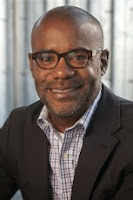 Tuesday marked one year since Fordham lost one of its most esteemed scholars, James R. Dumpson, Ph.D., a tireless advocate for the poor and a former dean of the Graduate School of Social Service (GSS).
Tuesday marked one year since Fordham lost one of its most esteemed scholars, James R. Dumpson, Ph.D., a tireless advocate for the poor and a former dean of the Graduate School of Social Service (GSS).
Next week, GSS will host a memorial lecture to honor Dumpson, who died Nov. 5, 2012 at the age of 103.
James R. Dumpson Memorial Lecture
Tuesday, Nov. 12 | 4 p.m.
Corrigan Conference Center / 12th-Floor Lounge
Lincoln Center Campus | 113 West 60th Street, NYC 10023
The featured speaker will be Bryan Samuels, executive director of Chapin Hall Center for Children in Chicago and former commissioner of the Administration for Children, Youth, and Families. Samuels’s lecture will center on child welfare, a topic about which Dumpson was passionate.
The memorial lecture is part of an ongoing series associated with the James R. Dumpson Chair in Child Welfare Research, a position created in 1980 to honor Dumpson and utilize the University’s education and research resources to improve the quality of life for vulnerable children.
The chair, which is currently held by Brenda G. McGowan, D.S.W., evokes Dumpson’s commitment to children by focusing its teaching, research, and advocacy on New York City children most in danger of losing their rights or not enjoying an adequate quality of life.
A reception will follow the lecture. RSVP by emailing Priscilla Dyer, or call (212) 636-6623.
Dumpson began at Fordham in 1957 as a visiting associate professor in the Graduate Institute of Mission Studies. After leaving to serve as deputy commissioner in the Department of Welfare, he returned to Fordham in 1967 to take the helm at GSS, becoming the first African-American dean of a non-black school of social work.
To read more about Dumpson and see a timeline of his career highlights, click here.
Read Dumpson’s obituary in The New York Times here.
— Joanna Klimaski